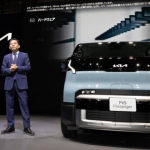Toyota, one of the most trusted names in the global automobile industry, has officially announced that it will build its first battery electric vehicle (BEV) in Europe at its Czech Republic plant. This marks a historic milestone for the brand, which has long been a leader in hybrid technology but has taken a measured approach to fully electric vehicles.
The move is not only significant for Toyota but also a major step forward for Europe’s electric mobility landscape. By localizing EV production, Toyota is making a strong commitment to sustainability, innovation, and meeting Europe’s rapidly growing demand for zero-emission vehicles.
Toyota’s Journey Toward Electrification
Toyota has always been at the forefront of green mobility. The brand revolutionized the automobile industry back in the late 1990s with the launch of the Toyota Prius, the world’s first mass-produced hybrid car. Since then, Toyota has sold millions of hybrid and plug-in hybrid vehicles worldwide.
However, when it came to battery electric vehicles, Toyota has been more cautious. The company focused heavily on hybrids and hydrogen fuel cell vehicles (like the Toyota Mirai), believing that a diversified approach was more practical. But now, with EV adoption accelerating in Europe and stricter emission regulations being enforced, Toyota is stepping up its BEV strategy.
The decision to manufacture an electric vehicle at its Czech plant is a clear signal that Toyota is ready to become a serious player in the EV segment.
Why the Czech Plant?
Toyota’s plant in Kolin, Czech Republic, has been a strategic facility for the company in Europe for years. Originally set up as a joint venture with PSA Group (now Stellantis), the plant has produced popular compact models like the Toyota Aygo and Yaris.
There are several reasons why Toyota chose this location for its first European EV:
- Strategic Location: Situated in Central Europe, the Czech Republic offers excellent access to both Western and Eastern European markets.
- Skilled Workforce: The plant has decades of experience in automotive manufacturing and a trained workforce capable of adapting to EV production.
- Existing Infrastructure: Toyota can leverage the plant’s established logistics, supply chain networks, and production capacity.
- European Regulations: By building EVs locally, Toyota ensures compliance with EU green mobility policies while avoiding import duties on EVs.
This makes the Czech plant the perfect launchpad for Toyota’s European EV ambitions.
What Kind of EV Will Toyota Build?
Although Toyota has not yet revealed detailed specifications of the upcoming EV, industry insiders suggest that it will likely be a compact or mid-sized battery electric vehicle.
Key expectations include:
- A city-friendly crossover or hatchback design, aligning with European consumer preferences.
- A driving range of around 300–400 km per charge, suitable for urban and suburban mobility.
- Advanced features such as connected infotainment systems, ADAS (Advanced Driver Assistance Systems), and fast-charging capabilities.
- Built on Toyota’s dedicated e-TNGA EV platform, designed for flexible configurations.
This model will not only cater to eco-conscious buyers but also compete directly with popular EVs such as the Volkswagen ID.3, Renault Megane E-Tech, and Hyundai Kona Electric.
Toyota’s European EV Strategy
The launch of Toyota’s first Europe-made EV is not an isolated move but part of a broader electrification roadmap.
- Expanding EV Portfolio – Toyota plans to launch 10 new battery electric models globally by 2026.
- Hybrid + EV Balance – While BEVs are growing, Toyota continues to invest in hybrid vehicles, which still dominate its sales in Europe.
- Sustainability Goals – The company has set a target of becoming carbon-neutral in Europe by 2040, with zero-emission vehicles forming the backbone of this transition.
- Local Production – By manufacturing in Europe, Toyota strengthens its commitment to regional markets while reducing logistics-related emissions.
This strategy underlines Toyota’s intent to adapt to Europe’s unique mobility needs, which are different from markets like the U.S. or Japan.
Impact on Europe’s EV Market
Europe is currently one of the fastest-growing EV markets in the world. Countries like Norway, Germany, France, and the Netherlands are leading the charge with high adoption rates, driven by government incentives and consumer demand.
Toyota’s entry into locally manufactured EVs will have several impacts:
- Increased Competition: The market will see stiffer competition, pushing all automakers to innovate.
- Lower Prices: Local production may reduce costs, making Toyota EVs more affordable.
- Boost to Supply Chains: European suppliers will benefit from Toyota’s demand for EV parts such as batteries, motors, and electronics.
- Consumer Confidence: Toyota’s reputation for reliability could persuade hesitant buyers to switch to EVs.
This is a win-win situation for both Toyota and European consumers.
Challenges Ahead for Toyota
While the move is bold, Toyota faces challenges as it steps into Europe’s BEV market:
- Strong Competition – Brands like Tesla, Volkswagen, Hyundai, and Renault have already established a strong foothold.
- Charging Infrastructure – Although growing, Europe still faces uneven distribution of charging stations, which may affect adoption in certain regions.
- Battery Supply Chain – Ensuring sustainable and affordable battery supply is a global challenge for all EV manufacturers.
- Balancing Hybrid and EV Demand – Toyota must carefully balance its hybrid sales with growing EV production without confusing its market positioning.
Overcoming these challenges will be crucial for Toyota’s success in Europe.
Toyota’s Global Vision for Electrification
Beyond Europe, Toyota has announced ambitious global EV plans:
- Aiming to sell 3.5 million EVs annually by 2030.
- Investing heavily in solid-state battery technology, which could revolutionize range and charging times.
- Expanding EV production facilities across Asia, North America, and now Europe.
The Czech plant is just one part of this larger puzzle. It represents Toyota’s determination to transition from a hybrid pioneer to a fully-fledged EV leader.
Conclusion
The decision by Toyota to build its first battery electric vehicle in Europe at the Czech plant is a landmark moment for both the brand and the continent’s EV industry. It reflects Toyota’s commitment to sustainability, innovation, and meeting the evolving demands of European consumers.
With a reputation for reliability, strong engineering, and customer trust, Toyota’s entry into Europe’s BEV market is expected to make a significant impact. While competition is fierce, Toyota’s balanced approach—combining hybrid expertise with new EV innovation—could give it an edge.
As the official launch draws closer, the automotive world eagerly awaits to see what Toyota will unveil from its Czech production line. One thing is certain: the future of mobility in Europe just became even more exciting.

Hello, my name is Muskan Kumari and I am an experienced Digital Marketer. I have been blogging for the last 3 years and I have special interest in SEO. Here I give you easy bikes and writes easy-to-understand reviews and news about the latest bikes, helping readers choose the best options.. My aim is to always provide you with accurate, new and useful information.










